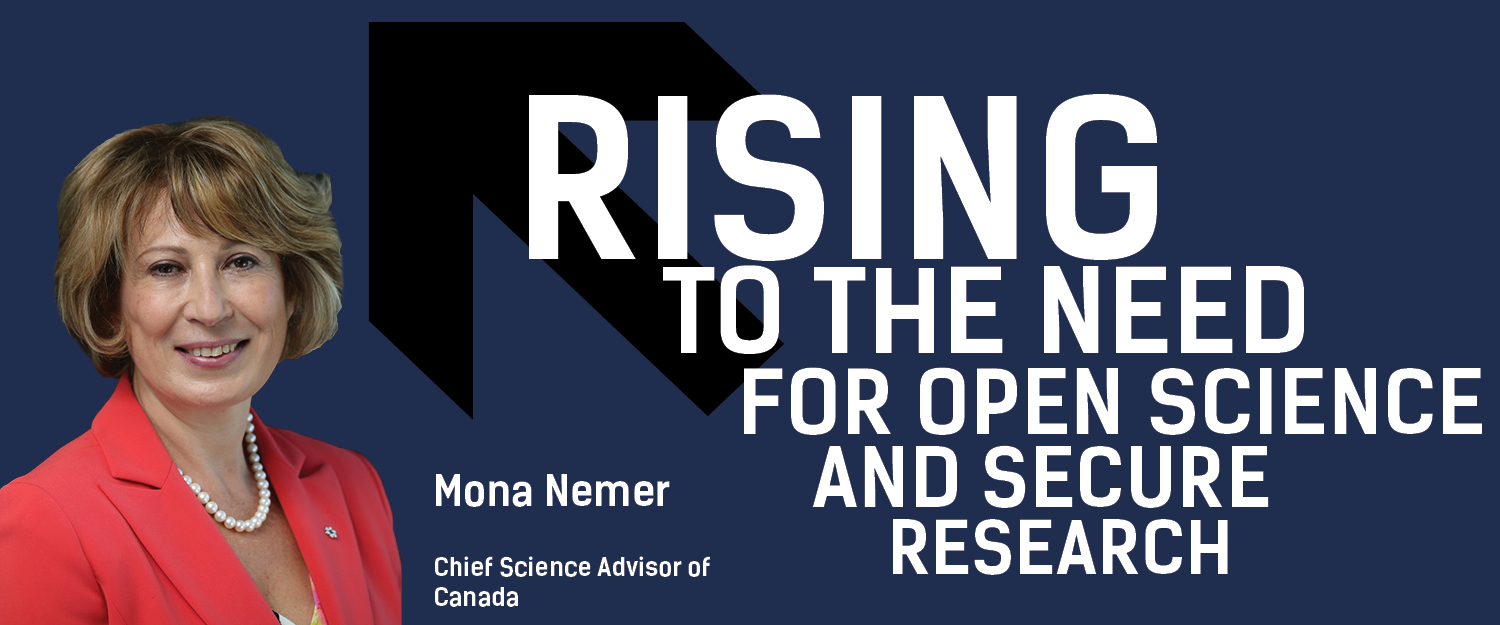Rising to the Need for Open Science and Secure Research

Author(s):
Mona Nemer
Canada
Chief Science Advisor
This past September, I had the honour of co-hosting the highly successful international INGSA 2021 conference with my colleague the Chief Scientist of Quebec. With more than 2000 delegates from 50 countries, the meeting was a much anticipated occasion to engage with the science advice community from around the world on important global issues and to shine a light on some emerging topics in science and policy.
One of the discussions that garnered much attention was on the value of open science in addressing global crises. Throughout the pandemic, open collaboration between scientists has been instrumental in developing diagnostics, treatments, and vaccines at an unprecedented speed, and open access to Covid-19 research has guided public health policy in real time. Sharing knowledge and working together across disciplines and national borders has saved lives and brought solutions to one of the greatest health crises the world has faced in a century. And in turn, people are increasingly recognizing the value of open science for advancing knowledge and building public trust.
Yet, despite this progress, questions persist around how to ensure continued benefits of openness in a time of increasing global competition. In today’s highly interconnected world, how do we reconcile the enormous benefits of scientific collaboration with the risk of research security threats? How do we create a research framework that balances the need for openness, transparency and trust with proper safeguarding against theft and misuse of scientific information?
After all, science and the good it generates are things we need to protect. Doing so requires frank discussions about research security, perhaps most urgently in those areas with the greatest transformative or innovative potential. Advanced technologies, from quantum computing to biotechnology, with their immense impact on health, food and national security, attract attention.
Consequently, we need balanced approaches and tools that assess risks to research integrity – from data quality to the scientific process itself – and safeguard research while fostering collaborations. Scientists have long supported the idea that scientific knowledge is universal. Ideas should be judged on their own merit, separate from the institutional or political contexts in which they have been generated. Collaboration with like minded partners is appealing, but we need to be wary of isolating ourselves in echo chambers.
This is because diversity of perspectives is essential for scientific progress. Research security should not become a reason or an excuse for turning inward, limiting dialogue and preventing scientific cooperation. In fact, science is a formidable diplomatic tool for keeping communication channels open between countries. Over the years, scientific collaboration has supported peace and often opened the way to economic and political dialogue and partnerships. Witness the human genome project, or the International Space Station, or the more recent development in 2018 of SESAME, the particle accelerator in the Middle East, whose motto is “science for peace.”
For this reason, any discussion of research security needs to be framed within open science and scientific integrity contexts. All three need to form a cohesive triad that enables research, protects the integrity of research outcomes, supports knowledge dissemination and maximizes the benefits of research and innovation for the world.
Finding the right balance, however, will depend on adjusting for different disciplines, different institutional contexts, and different research questions. An accepted approach will require the combined complementary perspectives of practitioners, ethicists, and legal and management experts. Assumptions and solutions need to be grounded in the reality of research and respect for democratic values. And above all, it requires buy-in from researchers.
Moreover, different areas of research have varying degrees of security requirements and collaborative output. One way of addressing this may be to establish risk assessment frameworks that adopt the “variable geometry” principle — an approach that would allow some flexibility in integrating standards and norms of a security framework. Given that it is virtually impossible to track every area of research, it is certain that some call for more scrutiny than others.
Potential dual-use technologies may require further agility. Again, a layered or modular approach that allows sector-specific frameworks could help achieve the objectives and produce greater collaboration across sectors. In other words, solutions will need to be tailored. By analogy to precision medicine, we should consider adopting “precision frameworks” to provide sustainable solutions. We need to be wary of one-size-fits-all approaches.
Ongoing success will require trust and collaboration between the scientific and security communities. This is where international organizations like INGSA can have an important role in bringing representatives together to identify common interests. Canada and other countries share many priorities, such as health security, clean technology and digital technologies. Establishing lists of these commonalities would help to create coherent approaches and accelerate best practices. More proactive engagement between researchers, funding agencies and the intelligence community will also have the benefit of increasing mutual understanding across the sectors and empowering researchers to protect their research, for both the national interest and the sake of science itself.
Overall, ensuring these security frameworks are practical and grounded in the reality of research will help achieve voluntary adherence and greater compliance among researchers and administrators. Success is important because openness, integrity and security in research generate trust in the scientific process and in scientific knowledge. Developing balanced and internationally recognized research security standards will make us better prepared for future global crises, and ensure that science can continue to deliver life-saving technologies and innovations that improve our world.

